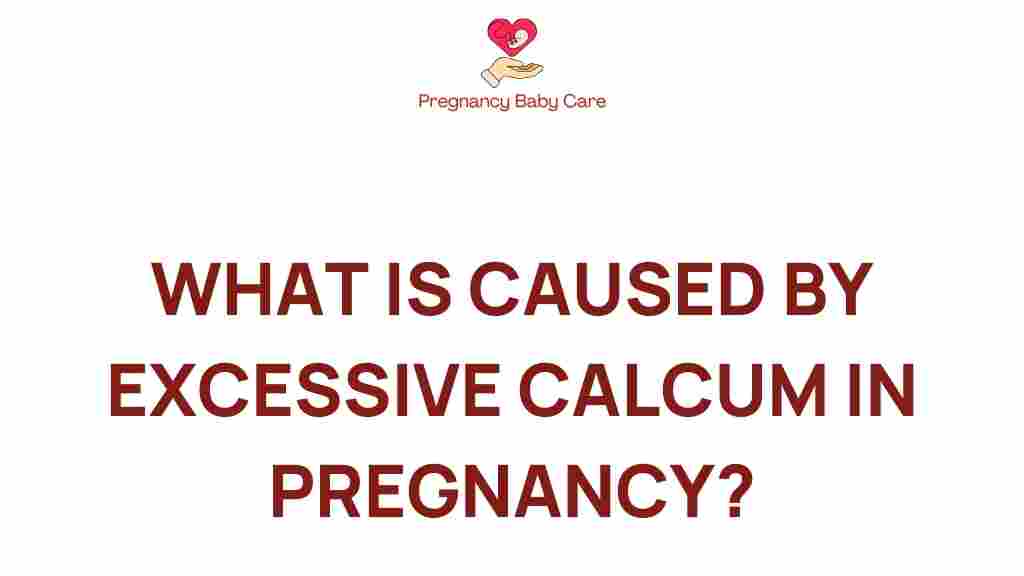Uncovering the Hidden Dangers of Excessive Calcium in Pregnancy
Pregnancy is a critical period that demands careful attention to maternal nutrition and health guidelines. While calcium is vital for both maternal and fetal health, excessive calcium intake during pregnancy can pose significant risks. Understanding the balance required in calcium consumption is crucial for ensuring optimal pregnancy health and promoting healthy fetal development.
The Importance of Calcium in Pregnancy
Calcium plays a fundamental role in pregnancy, supporting the development of the baby’s bones and teeth, as well as contributing to various physiological functions in the mother. The recommended dietary allowance (RDA) for calcium during pregnancy is higher than for non-pregnant women. Here’s why calcium is essential:
- Bone Development: Calcium is crucial for the developing fetus to form a strong skeletal structure.
- Muscle Function: It aids in muscle function, including the uterine muscles during labor.
- Nerve Transmission: Calcium is vital for nerve function, affecting both mother and baby.
- Blood Clotting: It plays a role in blood clotting, which is essential during childbirth.
Understanding Excessive Calcium Intake
While calcium is necessary, excessive calcium can lead to complications. The term “excessive calcium” refers to calcium intake that significantly exceeds the recommended levels. It is crucial to follow health guidelines to prevent issues related to high calcium levels. The risks associated with excessive calcium intake include:
- Kidney Stones: High calcium levels can lead to kidney stones, causing pain and complications.
- Hypercalcemia: This condition results from elevated calcium levels in the blood, leading to nausea, fatigue, and confusion.
- Interference with Other Nutrients: Excessive calcium can impede the absorption of other crucial nutrients like iron and zinc.
- Potential Impact on Fetal Development: There are concerns that high calcium intake may affect fetal development adversely.
Recommended Calcium Intake During Pregnancy
Health guidelines suggest that pregnant women should aim for an adequate intake of calcium without exceeding the recommended levels. Here are the general recommendations for calcium intake during pregnancy:
- For Pregnant Teens (14-18 years): 1,300 mg per day
- For Pregnant Adults (19-50 years): 1,000 mg per day
It’s essential to consult with a healthcare provider to assess individual needs, as some women may require more or less calcium depending on their dietary habits and health conditions.
Sources of Calcium
Incorporating calcium-rich foods into your diet can help meet the recommended intake without excessive supplementation. Here are some excellent sources of calcium:
- Dairy products (milk, cheese, yogurt)
- Leafy green vegetables (kale, broccoli, bok choy)
- Fortified foods (cereals, plant-based milk)
- Fish (sardines, salmon with bones)
- Nuts and seeds (almonds, chia seeds)
Step-by-Step Process: Balancing Calcium Intake
To maintain optimal pregnancy health and avoid excessive calcium intake, follow these steps:
- Consult Your Healthcare Provider: Discuss your dietary habits and any supplements you take.
- Monitor Your Diet: Keep a food diary to track calcium consumption.
- Choose Natural Sources: Focus on obtaining calcium from natural foods rather than supplements.
- Use Supplements Sparingly: If necessary, use calcium supplements only under medical advice.
- Stay Informed: Keep up with the latest health guidelines regarding calcium and pregnancy.
Risks of Excessive Calcium in Pregnancy
As mentioned earlier, excessive calcium intake can lead to several health risks. Here are some specific risks that pregnant women should be aware of:
- Hypertension: High calcium can lead to elevated blood pressure, which is dangerous during pregnancy.
- Increased Risk of C-sections: Some studies suggest that excessive calcium may increase the likelihood of cesarean deliveries.
- Impaired Fetal Growth: Excess calcium may interfere with fetal growth patterns.
Troubleshooting Tips
If you suspect you are consuming excessive calcium, consider the following troubleshooting tips:
- Review Your Supplements: Check any prenatal vitamins or calcium supplements for their dosage.
- Analyze Your Diet: Look for hidden sources of calcium in processed foods.
- Consult a Dietitian: A registered dietitian can help tailor a nutrition plan suitable for your pregnancy needs.
Conclusion
Calcium is a crucial component of maternal nutrition and plays a significant role in fetal development. However, understanding the risks associated with excessive calcium intake is essential for maintaining pregnancy health. By following health guidelines, monitoring dietary habits, and consulting with healthcare providers, pregnant women can achieve a balance that supports both their health and the health of their unborn child. Always prioritize natural food sources and be cautious with supplements to avoid the hidden dangers of excessive calcium.
For further information on prenatal care and nutrition, consider visiting this resource.
Remember, a well-balanced diet is key to a healthy pregnancy, ensuring both mother and baby thrive.
This article is in the category Pregnancy and created by PregnancyBabyCare Team
